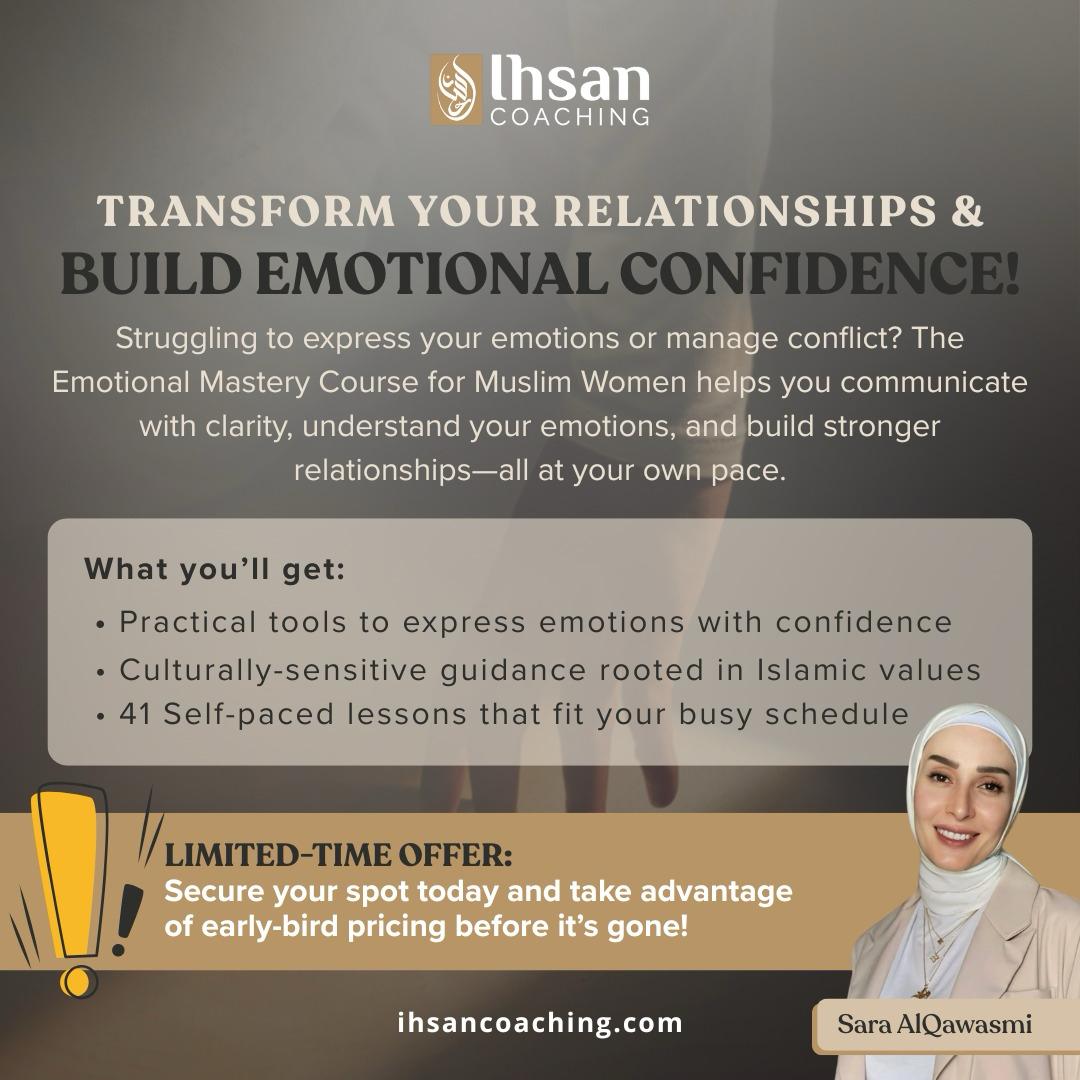Emotions, especially in the context of Muslim mental health, can often seem like navigating a stormy sea. In the midst of these turbulent emotional waters, guidance from Muslim life coaches, coupled with the wisdom of Islamic teachings, serves as a beacon of hope, steering us toward the shores of inner peace. This post delves into how Islamic principles and the insightful guidance of Muslim life coaches offer a compass for transforming our emotions, guiding us from the depths of anger to the tranquility of peace.
Introduction to Emotion Processing in Muslim Mental Health
Mastering our emotions is essential to feeling good as a Muslim, and knowing how to handle feelings, especially from anger to feeling calm, is very important. That’s precisely what a Muslim life coachcan help with—digging into Islamic teachings and educating about mental health well-being to help us better understand and manage our emotions.

Recognizing Anger: Understanding its Manifestation
Anger possesses an immense power over mental health well-being, particularly within the Muslim community. Islamic teachings provide precise insights into its nature, triggers and consequences on mental health well-being.
The Quran and Hadith draw special attention to the significance of managing anger, emphasizing patience, forgiveness and self-control as essential virtues. These teachings act as guiding lights, offering a precise roadmap to navigate the complexities of anger and its impact on mental equilibrium. Integrating these teachings into daily life fosters resilience, promoting inner peace and robust mental health well-being within the Muslim community.
Islamic Perspective on Managing Emotions
Islamic teachings offer a comprehensive framework for managing emotions. Discover how these teachings provide strategies and principles for controlling anger and finding inner peace. Explore the wisdom within Islamic teachings that guide individuals toward emotional balance. Consider the story of Yusuf (Joseph), a Prophet who faced immense trials and anger-inducing situations. Yet, his journey from being wronged to forgiving his brothers illustrates the profound Islamic principles of patience and forgiveness. Imagine the anger he must have felt, yet he chose the path of peace and forgiveness, as guided by Islamic teachings.
The Role of Islamic Therapy in Emotion Processing
Islamic therapy blends psychological knowledge with deep Islamic insights to help individuals navigate their emotional experiences. Therapists combine psychological science and timeless Islamic principles, offering tailored guidance and religious consultation to nurture understanding, healing, and inner peace.
Empowering Emotions: Guidance from a Muslim Psychologist
A Muslim psychologist can combine psychology and spirituality, giving advice rooted in Islamic teachings. They help people navigate emotions by blending psychological know-how with deep wisdom, promoting clarity, strength, and spiritual harmony.
Emotional Harmony: Life Coaching Strategies
Emotional balance techniques, with the help of a life coach with Islamic values, empower individuals to journey from turmoil to tranquility. Personalized strategies, aligned with Islamic teachings, facilitate emotional balance, enabling individuals to harmonize their emotions with ethical and spiritual guidance.

Steps to Transition: Practical Techniques
1. Practice Mindfulness and Dhikr
Finding Serenity in Reflection
Mindfulness, focusing on the present moment, and Dhikr, the remembrance of Allah, are powerful tools for bettering Muslim mental health well-being and managing anger. These practices allow for a calmer mind and heart, aligning with Islamic teachings emphasizing reflection and spiritual connection.
Let’s take Dhikr, the Islamic practice of remembering Allah, for example. It’s not just a ritual; it’s a moment to re-center our emotions. For instance, when feeling a surge of anger, repeating ‘Astaghfirullah’ (I seek forgiveness from Allah) can help an individual become more at ease.
2. Embrace Self-Reflection
Discovering Inner Balance
Taking time for self-reflection is like hitting the pause button. It allows for a deeper understanding of our feelings and reactions. In Islam, self-reflection is valued as it leads to self-improvement, aiding in managing emotions like anger.
3. Cultivate Patience
Nurturing Emotional Resilience
Patience is a virtue emphasized in Islamic teachings. Practicing patience when faced with anger-inducing situations helps maintain composure and respond thoughtfully rather than impulsively.
4. Seek Community Support
Building a Supportive Network
In Islam, community support is crucial. Engaging with a supportive community or seeking advice from knowledgeable individuals helps gain perspective and resolve anger-related issues.
5. Channel Anger Constructively
Redirecting Energy to Positivity
Instead of suppressing anger, Islam encourages channeling it into constructive actions. Transforming anger into positive energy through activities like volunteering or exercising can be therapeutic and aid emotional regulation.
As we conclude this journey from anger to peace, remember that these are not just teachings but a way of life. How will you apply these principles in your daily interactions? Share your thoughts and experiences and join us at Ihsan Coaching for a deeper exploration of Islamic teachings and fostering better mental health well-being for Muslims.
1. How can Islamic teachings help in managing anger?
Islamic teachings provide profound guidance on managing anger. The Quran emphasizes patience, forgiveness, and controlling anger. Prophetic traditions (Ahadith) offer practical strategies, such as seeking refuge in Allah from anger and performing ablution to calm oneself.
2. Is seeking help from a Muslim psychologist in line with Islamic beliefs?
Seeking help from a Muslim psychologist aligns with Islamic beliefs. Islam encourages seeking knowledge, including understanding of mental health well-being. While using professional expertise, psychologists can integrate Islamic principles into therapy, respecting religious values.
3. What are the differences between Islamic therapy and conventional therapy?
Islamic therapy intertwines psychological techniques with Islamic principles, addressing emotional issues while considering faith-based aspects. Conventional therapy focuses solely on psychological methods without necessarily incorporating religious or spiritual elements.
4. Can a life coach incorporate Islamic principles in their coaching sessions?
A life coach can integrate Islamic principles into coaching sessions. They personalize strategies rooted in Islamic values, fostering emotional balance while aligning with patience, gratitude, and self-improvement teachings.

Embrace the Calmness: Ihsan Coaching for Anger Management
At Ihsan Coaching, we grasp the challenges of handling emotions, particularly anger, aiming to elevate Muslim mental health. Through our empathetic and specialized approach, we deeply understand your emotional triggers, offering guidance that aligns with Islamic teachings. With our dedicated coaching, we walk alongside you on this transformative journey, helping you harness your emotions positively, paving the way to a more balanced and peaceful life.




